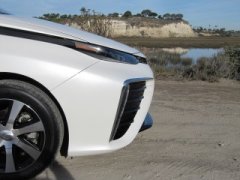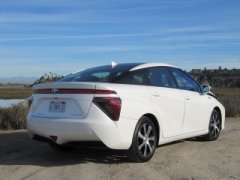YAHOO AUTOS
All automakers expect to lose money at first when they launch expensive new powertrain technologies.
But if one European official with deep experience in alternative-fuel infrastructure is right, the 2016 Toyota Mirai hydrogen fuel-cell sedan may be losing its maker quite a lot of money indeed.
At the Challenge Bibendum green-car competition held last month in Chengdu, China, a panel discussion on fueling and charging infrastructures for different green vehicles included some cost estimates.
They came from Pat Cox, a former president of the European Parliament. Cox currently works with TransEuropean Networks, an agency promoting better connection and coordination among businesses and infrastructure in the European Union.

2016 Toyota Mirai hydrogen fuel-cell car, Newport Beach, CA, Nov 2014
That would be $62,000 to $124,000 each, after its U.S. purchase price of $57,500 (before any Federal or state incentives).
And while the panel agreed that government support was required to kickstart a hydrogen infrastructure, Autoblog Green said, all parties agreed that ultimately it would have to be commercially viable in the for-profit sector.

2016 Toyota Mirai
Among global automakers, Toyota has by far the most aggressive plans to launch hydrogen-powered vehicles.
The Japanese company, presently the world's largest automaker, is notable for its criticism of battery-electric vehicles, which it consistently says will play only a minor role as small, short-distance urban vehicles.

2016 Toyota Mirai hydrogen fuel-cell car, Newport Beach, CA, Nov 2014
The company launched the world's first modern hybrid-electric car in 1997, and has since built more half of the existing hybrid vehicles on the planet.
It's widely assumed to have lost significant money on each Toyota Prius it sold for the car's first eight to 10 years.


No comments:
Post a Comment